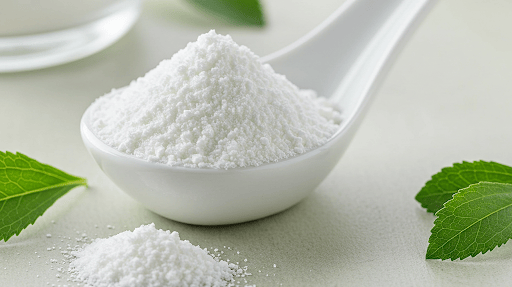Tate & Lyle Explores the Prebiotic Benefits of Non-Caloric Sweeteners
BEVERAGESCONFECTIONARYNUTRACEUTICALS


This is an AI generated illustration and does not represent actual product or service.
Tate & Lyle, a global leader in food ingredients, continues to innovate in the field of non-caloric sweeteners (NCS), with a particular focus on their potential health benefits, including their impact on gut health and metabolic disorders like Type 2 Diabetes (T2D). In partnership with Cryptobiotix, pioneers in preclinical gastrointestinal research, Tate & Lyle has conducted studies exploring how low and no-calorie sweeteners like allulose, erythritol, stevia, and sucralose affect the human gut microbiota. These sweeteners offer promising alternatives to traditional sugar, with the added benefit of potentially improving metabolic health.
Health Implications: A Prebiotic Approach to Gut Health
Tate & Lyle’s research aligns with growing evidence that the gut microbiota—the trillions of microorganisms living in our digestive system—plays a critical role in metabolic health. Disruptions in this microbial balance, known as dysbiosis, are associated with several chronic diseases, including obesity, metabolic syndrome, and Type 2 Diabetes. Tate & Lyle's studies are exploring how certain non-caloric sweeteners can promote a healthier gut microbiome and improve metabolic function.
Their latest ex-vivo study, conducted with Cryptobiotix, showed that sweeteners such as stevia and allulose may support gut health by promoting the growth of beneficial bacteria and the production of short-chain fatty acids (SCFAs). SCFAs like butyrate are crucial for maintaining a healthy gut environment and have been linked to improved insulin sensitivity and reduced inflammation, which are key factors in managing Type 2 Diabetes. (Source)
Key Findings: Sweeteners and Their Impact on Gut Microbiota
In February 2024, Tate & Lyle and Cryptobiotix published a study that revealed exciting insights into how low and no-calorie sweeteners interact with the human gut microbiota. This pre-clinical research used Cryptobiotix's SIFR® (Cipher) technology to recreate the human gut environment outside the body, offering a more controlled and precise analysis of sweetener impacts.
The results showed that sucralose, a common low-calorie sweetener, does not significantly impact the gut microbiota, which is consistent with previous findings. However, other sweeteners such as stevia, allulose, and erythritol demonstrated potentially beneficial effects, particularly in their ability to promote the growth of health-supporting bacteria. These sweeteners were found to be easily fermented in the gut, leading to an increase in the production of SCFAs, which support gut health and enhance metabolic processes like insulin sensitivity.
Non-Caloric Sweeteners and Their Unique Properties
They have also filed a patent application (WO2025083419A1) on allulose and erythritol which complements the findings from the Cryptobiotix study, adding further support to the potential health benefits of these sweeteners. Their patent includes the use of:
Allulose: A Prebiotic Powerhouse
Allulose, a rare sugar found naturally in small amounts in certain fruits, has attracted significant attention for its ability to provide a sugar-like taste without contributing calories. Recent research by Tate & Lyle has shown that allulose not only provides a sweetness similar to sugar but also acts as a prebiotic. It can stimulate the growth of beneficial gut bacteria that produce butyrate, an SCFA linked to enhanced gut health and improved insulin sensitivity.
This ability to promote butyrate production makes allulose a valuable tool in supporting gut microbiota balance and improving metabolic health, particularly for individuals managing Type 2 Diabetes.
Erythritol: A Slow-Release Prebiotic
Erythritol, another widely used non-caloric sweetener, works differently in the gut compared to allulose. While erythritol is not fermented as rapidly as allulose, it still supports the growth of beneficial bacteria such as Anaerostipes hadrus. This slower fermentation process may contribute to more sustained health benefits over time, promoting a healthier gut microbiota and potentially enhancing glucose metabolism.
The prebiotic effects of erythritol offer a more gradual but steady improvement in gut health, making it an excellent choice for inclusion in foods aimed at promoting metabolic wellness.
Stevia: A Sweetener with Potential Gut Benefits
While allulose and erythritol are key areas of focus for Tate & Lyle, the latest study highlights the benefits of stevia—a natural, plant-derived sweetener. The research found that stevia, like allulose, is easily fermented in the gut and supports the growth of beneficial bacteria. This makes it another promising candidate for improving gut microbiota health.
Stevia's ability to increase the density of health-supporting bacteria and promote the production of SCFAs further underscores the potential of low and no-calorie sweeteners as more than just sugar substitutes—they could be functional ingredients that contribute to long-term health.
Combining Sweeteners for Synergistic Effects
Tate & Lyle’s research also suggests that combining allulose and erythritol could have synergistic effects on gut health, amplifying their individual benefits. While allulose quickly boosts butyrate production, erythritol’s slower fermentation may ensure more sustained benefits over time, offering a dual approach to improving gut microbiota and metabolic health.
These findings suggest that formulating products with a blend of these sweeteners could lead to greater health benefits and pave the way for new, health-focused food and beverage products.
Impact on Type 2 Diabetes: A Potential Game-Changer
With Type 2 Diabetes affecting millions worldwide, managing blood sugar levels and improving insulin sensitivity are critical challenges. The research by Tate & Lyle and Cryptobiotix presents a new avenue for managing these conditions—by supporting the growth of beneficial gut bacteria through non-caloric sweeteners. The beneficial effects of these sweeteners on gut microbiota composition could help improve insulin sensitivity, reduce inflammation, and support glucose metabolism, providing an additional tool for individuals with Type 2 Diabetes.
Conclusion: Paving the Way for Healthier Alternatives
Tate & Lyle’s work in the field of non-caloric sweeteners is pushing the boundaries of what these ingredients can offer. Through research partnerships and innovative studies, the company is uncovering the potential of sweeteners like allulose, erythritol, and stevia to improve gut health and manage Type 2 Diabetes. With these advancements, Tate & Lyle is not only creating healthier alternatives to sugar but also pioneering a new era of functional food ingredients that promote overall well-being.
As the company continues to refine its research and patent new methods for incorporating these sweeteners into food products, consumers can look forward to a future where healthier food options are not only delicious but also contribute to improved metabolic health.


